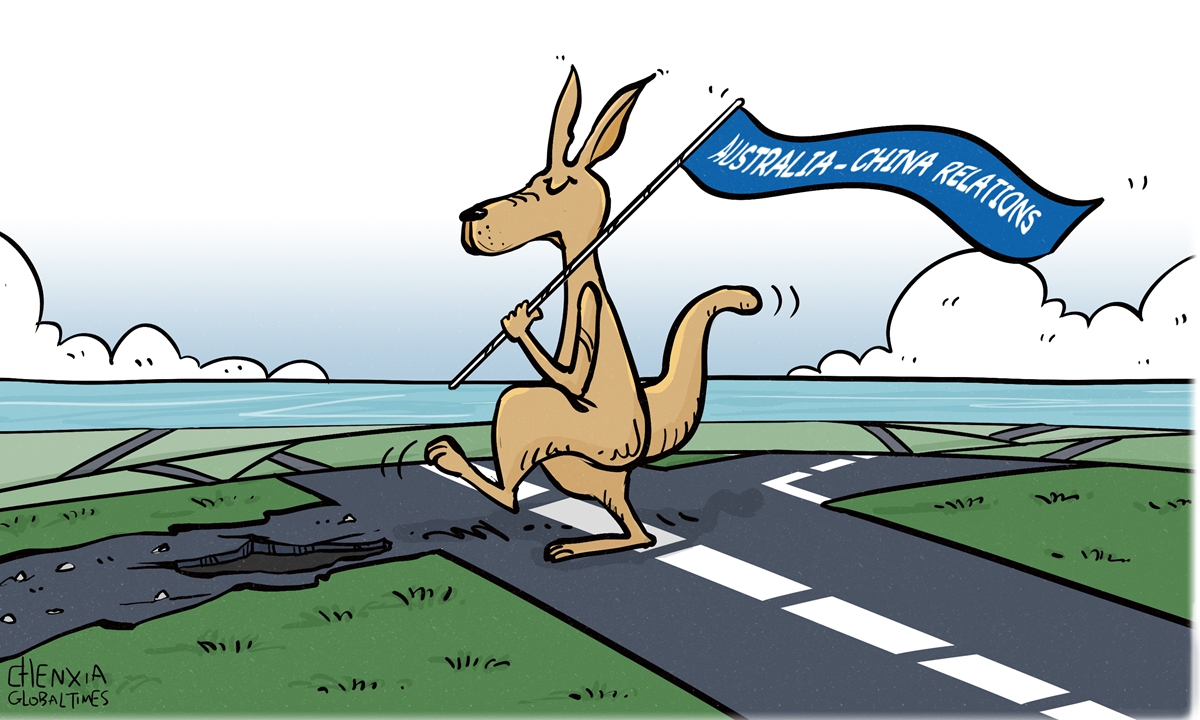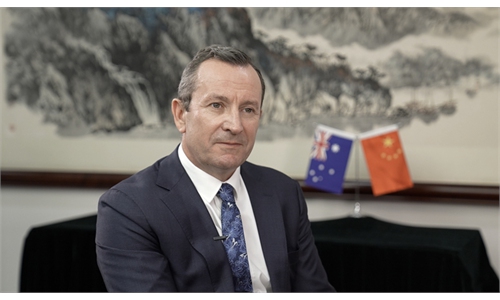
Illustration: Chen Xia/GT
Australia's newly published Defence Strategic Review is a revamp of Australia's defence strategy after the Labor government took office in May last year. The Review correctly assesses the geopolitical reality in the Indo-Pacific region as no longer being dominated by the US as "the unipolar leader," but it makes a fundamentally and strategically misguided appraisal of Australia's relationship with China. Instead of accurately acknowledging China as Australia's comprehensive strategic partner, the report maintains the platitudinal hype of the "China threat theory," which serves as the keystone for the alarming militaristic course Australia is about to take with the stockpiling of its military arsenal and the build-up of its armed forces.
In a nutshell, the long-awaited Review reflects Australia's new geostrategic stance as being more offensive than basically defensive. The Australian defence force is said to be "in the missile age" and therefore should be developing the ability to "precisely strike targets at longer range." The development and deployment of the nuclear-powered submarine fleet under the AUKUS agreement, for example, aims to equip Australia with the capability to project the striking power far away from its own coast.
Such a tactic change drastically deviates from the defence philosophy of the 1986 Dibb Report long held by different governments of Australia over the decades, which has focused on the defence of the Australian continent by shielding and fending away possible invasion from the land's north. A dangerously aggressive strategy is taking shape to engage and even provoke military conflicts far beyond its shores, with the purported objective to work in conjunction with the US' hegemonic strategy.
When releasing the Review, Australian Prime Minister Anthony Albanese asserted that Australia would build the strength of its security "by seeking to shape the future rather than waiting for the future to shape us (Australia)." However, it is plain to any eye that this military blueprint is largely shaped by Washington's Indo-Pacific Strategy aiming to deter, contain and thwart China's development.
Although the new government in Canberra has noticeably abandoned the senseless and fanatical rhetoric and hostile China policy adopted by the previous Morrison administration, it is both a misjudgement to identify China as Australia's threat or adversary, and a miscalculation to prepare Australia for military confrontation with its largest trade partner.
Since the Albanese administration took power after last year's federal parliament election, Canberra has been proactively working with the Chinese side to try to reverse the course of decline of the bilateral relations. Since the Bali summit in November last year between President Xi Jinping and Albanese, the two countries have taken the initiative to open dialogues and communication so as to pave the way to substantively improve and strengthen the relationship.
In recent months, Australia's federal ministers, state premiers, and business and education leaders have been flocking to visit China to meet with their counterparts and partners. Significant progresses have been made, in particular business and trade areas. According to the latest trade statistics released by the Chinese Customs, Australia's export to China achieved a 20-percent increase in the first three months this year. The two countries have agreed to negotiate on previous trade issues to seek proper settlement to the anti-dumping and anti-subsidy disputes regarding exports of commodities such as barley. Both sides are also working actively to reach agreements on issues such as quarantine and quality control to facilitate trade of other agricultural and seafood exports.
It is therefore very clear that China-Australia relations have reached a most critical tipping point. A defence strategy which is purported to instigate and provoke tensions with China is apparently imprudent, and could jeopardise the hard-won outcomes achieved during the past six months.
China has never deemed Australia as a threat or military adversary. As a matter of fact, China regards Australia as not only one of its foremost economic and trade partners, but also a significant force to work conjointly to maintain peace, stability, and prosperity in the Asia Pacific region.
In October 1973, Gough Whitlam visited China as the first Australian prime minister. His strategic insight and courage were decisive to the constructive and fruitful partnership that have been mutually beneficial to both China and Australia for the past 50 years. Will Albanese, the new Labor head of state, have the similar political wisdom to withstand external pressures to steer the bilateral relations to a new course of success?
The author is president of the Chinese Association of Australian Studies, and professor and director of the Australian Studies Centre at East China Normal University. opinion@globaltimes.com.cn


